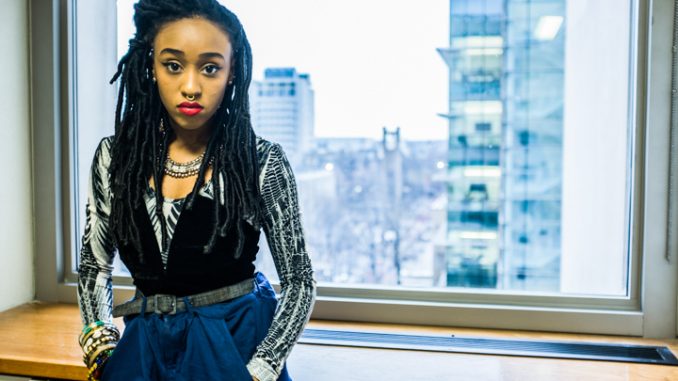
“Don’t be a Menace to South Central While Drinking Your Juice in the Hood,” the satirical film of Wayans brothers renown, was a staple in Melanie McCoy’s childhood. So, she said she always knew there were stereotypes associated with Black Culture.
The senior didn’t initially intend to major in African American studies at Temple; she was first a journalism major. But after her first course with doctoral student Ifetayo Flannery, Blacks in Cinema, McCoy realized her passion for studying the subject matter she has a deeply personal relationship with.
“It was pretty amazing to see a young black woman teaching the course,” McCoy said of her first encounter with Flannery.
Today, 22-year-old McCoy is immersed in the African American Studies Department and community service organizations, as the president of the Organization of African American Studies Undergraduate Students, recent member of Sankofa Community Empowerment’s Philadelphia chapter and tutor at Tree House Books.
From March 11-14, she’ll be one of the first undergraduate students to represent Temple University at the National Council for Black Studies since 1992. She’s entered her research paper on Afrofuturist musicians, including Frank Ocean and FKA Twigs, into an NCBS competition, the results of which will be released in early February.
“The inspiration that comes from seeing her peers engage in conversation and academic dialogue with scholars is extraordinary,” African American Studies Department Chair Dr. Molefi Asante said in an email, regarding McCoy’s plan to attend the conference. “We are all proud of Melanie’s multi-dimensional talents and her guidance of the undergraduate majors in our department.”
Last year, 14 graduate students from Temple’s African American Studies Department attended NCBS, where they presented papers and sat on panels. Asante called the conference “the most important professional organization in the field of African American Studies.”
After McCoy and her friend and colleague, senior African American studies major Kezia Barnett, attend NCBS this year, McCoy said they will encourage fellow undergraduate students to continue representing Temple in years to come.
“I want to bring back more fire [to OAASUS],” McCoy said. “My hope is that whatever Kezia and I learn and we find, that if it matches up with their interests, they can learn and take off.”
Barnett, who plans to attend graduate school in the fall for community-oriented primary care, agreed and added, “it’s going to be a great opportunity to expand our members.”
“The No. 1 question people ask when you major in Black Studies is, ‘What are you going to do with that when you graduate?’” Barnett said. She thinks she and McCoy will bring back knowledge about how the discipline does apply to a diverse range of careers and community-driven initiatives, like her own interest in public health.
First, McCoy and Barnett have to get to NCBS, which will be held at the Westin Los Angeles Airport in California. Though the African American Studies Department has covered her hotel fees, McCoy said, she still needs to pay for her airfare, the conference attendance fee of $125 for student members and living expenses for her time there.
In order to raise the money she needs, McCoy is selling her artwork, which she describes as Afrofuturist and Sankofic. The pieces typically sell for $100 or more – she still needs to sell $400 worth of work.
Sankofa, which can mean “to go back and catch it” or “you can’t know where you’re going unless you know where you’ve been,” is an African word used by some scholars of African American literature and Black Culture. For McCoy, painting is a way to express the womanist and Afrofuturist ideals that now dominate her approach to African American Studies.
“I felt like I had a kid, and someone took the kid away,” McCoy said of selling her first piece of art – despite the necessity of her fundraising. “I think art complements everything that I speak of, everything that I do. It survives the digital age, as well. I talk about imagination, and future possibilities and Afrofuturism.”
After tweeting out an announcement that she was selling her work to attend NCBS, McCoy said she was surprised by the significant response she received.
Flannery, who said McCoy’s plan to attend NCBS means “our students are at the forefront of our discipline,” has several of McCoy’s works in her home. McCoy created a three-piece series for Flannery that Flannery likes to refer to as “Lady Moon” – in the paintings, the moon is a black woman’s face surveying a city.
“I think [Afrofuturism] is going to be really big for the new generation to take that and develop what we know,” Flannery said of McCoy’s scholarly interests.
The complexities of McCoy’s academic studies and stance on Afrocentrism are manifested in each brushstroke; McCoy herself realizes the controversial nature and many differing opinions on what she called Black Consciousness.
“There’s a difference between freedom and liberation,” she said. “Freedom is more physical, but liberation is a mindset. Once you can free yourself mentally, it doesn’t matter if someone tries to chain you physically. That was a message I wanted to spread to other people of African descent.”
Erin Edinger-Turoff can be reached at erin.edinger-turoff@temple.edu or on Twitter @erinJustineET



Be the first to comment